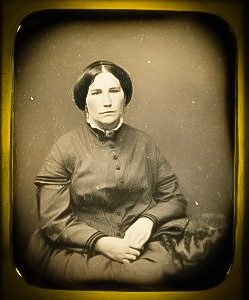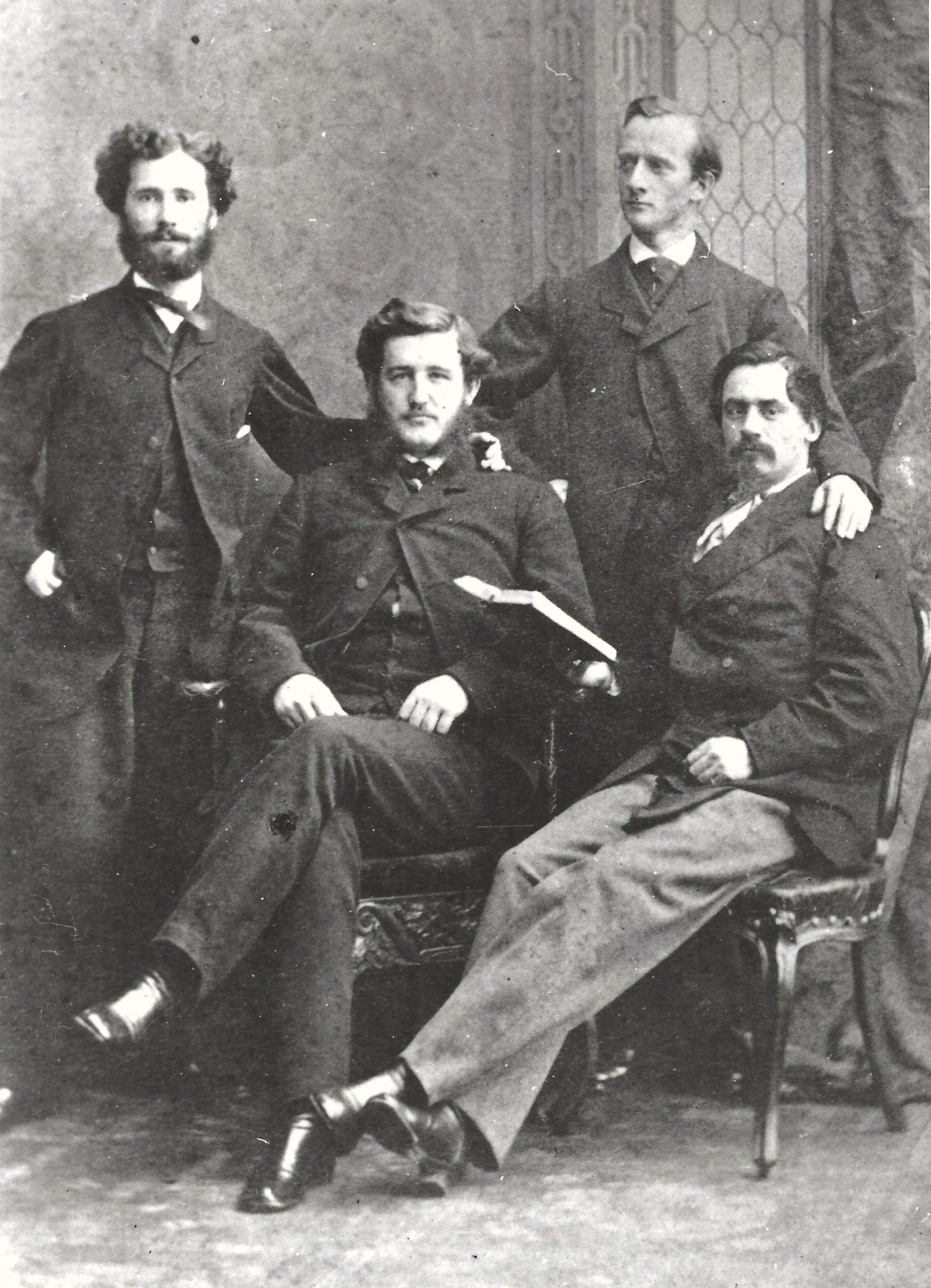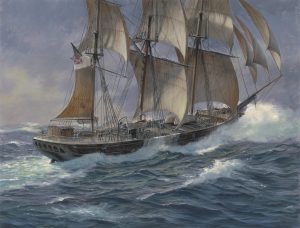From the ECW Archives: Queen of the Delphine, Part I

A warship at sea was an exclusively male domain and sailors were a superstitious lot. Having a woman on board was unlucky as well as a confounded nuisance.
In December 1864, one New England lady found herself a prisoner of war in the Indian Ocean—about as far from familiar battlefields as it is possible to be.
Her captors, Southern gentlemen all, were befuddled by an enemy female in their midst. She, like so many courageous, strong-willed women on both sides in the Civil War, fought back. This is their story.
The CSS Shenandoah was enjoying fine weather and fresh breezes, skipping along close hauled on the starboard tack when a cry of “Sail ho!” interrupted the monotony of sea life. The Confederate banner ran aloft; the signal gun barked, and the stranger hove to for inspection.

Under command of Captain James I. Waddell, a North Carolinian, Shenandoah was on her way to Melbourne, eventually to the Bering Straits, and on around the globe flying the last Confederate banner. She had destroyed seven Yankee vessels on the trip down the Atlantic, and would take thirty more—most of them weeks after Appomattox.
Sailing Master Irving S. Bulloch, a son of Georgia, rowed across with an armed crew to take charge. She was the bark Delphine of Bangor, Maine on her maiden voyage with Captain William Green Nichols in charge, accompanied by his wife, Lilias, and six-year-old son, Phineas.
When Bulloch boarded, Mrs. Nichols confronted him: “I suppose you are going to steal my Canary birds, so you had better take them at once!” Her father was primary owner of the vessel with her husband having a third share.[i]
Delphine was seventy days from London in ballast bound for Burma to load rice, which Waddell assumed would be supplied to Federal armies. Once aboard Shenandoah, Nichols pleaded his wife’s health, saying with tears in his eyes that it would be the death of her if she were moved in such a delicate state. Waddell sought the opinion of South Carolinian and Ship’s Surgeon, Dr. Charles Lining. The doctor thought it sounded like an excuse to get away: “I told the Captain so & he rather reluctantly, I think, determined to burn her….”[ii]
The boats returned about 6:00 p.m. with all Delphine prisoners and baggage. As they rocked and bounced in the choppy seas, in danger of being crushed against the ship’s hull, the crew rigged a sling from the main yard and hauled the lady and boy aboard. “The Captain’s wife, woman like, brought with her a canary bird in its cage,” recalled Master’s Mate Hunt, “and if a bandbox containing her best bonnet had been added to her baggage, it would have been complete.”[iii]
The prize was raided for sheep and pigs. Waddell regretted not recovering additional stores, furniture, and other useful items that could not be brought over in the high winds and heavy seas. Night descended as Delphine was fired.
“Rapidly the flames gathered headway, casting a fierce, lurid glow over the heaving bosom of the ocean,” wrote Hunt. “From doors, windows, and hatchways they burst forth like the vengeful spirit of destruction, wound up the spars, stretched out upon the yards, swiftly enveloping shrouds, sails, and halyards in one splendid, fiery ruin ; and standing out, strongly revealed against the darkening sky, the burning vessel surged and tossed, a holocaust to the God of War.”[iv]
As Shenandoah sailed away, Hunt observed Captain Nichols pacing the deck with his wife, watching their vessel burn. “He probably had there invested the savings of half a lifetime of patient toil. To see the fruits of so many years swept away in an hour, might well try the philosophy of the best of men.” The fiery glow in the sky dropped below the horizon around three o’clock in the morning.[v]
Among the officers, reactions to their female guest were nearly unanimous. “A finer looking woman I have seldom seen, physically,” wrote Dr. Lining. Midshipman John Mason of Virginia: “The Captain’s wife is quite a pretty woman but rather a strong minded one…. I rather think she wears the breeches.”
 (Picture from left: Midshipman John T. Mason, Midshipman O.A. Browne, Lieutenant William Whittle, Lieutenant Sidney Smith Lee, nephew of R.E. Lee. (Museum of the Confederacy, Richmond, VA))
(Picture from left: Midshipman John T. Mason, Midshipman O.A. Browne, Lieutenant William Whittle, Lieutenant Sidney Smith Lee, nephew of R.E. Lee. (Museum of the Confederacy, Richmond, VA))
Another Virginian, First Lieutenant William Whittle, agreed, adding that she was anything but an invalid. “At first she is a little frightened but we can soon drive fear away by proving by kindness that we are gentlemen.”[vi]
Lilias Nichols was a down-easter from Searsport, Maine where almost ten percent of the 1,700 inhabitants were ship captains, including five uncles.
“When she came off she looked mad as a bull, but it only amused us,” recalled Lieutenant Grimball. The lady accosted the captain in the wardroom, demanding in a stentorian voice to know where they would be landed. “On St. Paul, madam, if you like,” said Waddell, referring to an isolated desolate island in the middle of the Indian Ocean. “Oh, no; never,” she responded. “I would rather remain with you.”[vii]
Waddell was surprised to see standing before him a tall, finely proportioned woman of twenty-six in robust health. “It soon became palpable she would be the one for me to manage, and not the husband. A refractory lady can be controlled by a quiet courtesy, but no flattery.” Lieutenant Chew’s only comment: “We have the trouble of another woman onboard.” [viii]

Shenandoah once again stretched her wings, all sail set and close hauled to the wind. December 30 was one of the most beautiful days they had seen. The heavy sea exhausted its mad passion and died away into long undulating swells. Captain Nichols confessed to Waddell his shame for having pleaded his wife’s alleged illness as an excuse to save the ship, but did not feel that the lie was wrong under the circumstances.
Mrs. Nichols seemed to get over her feelings and appeared a ladylike person, noted Grimball. “She is treated with every consideration. I suppose she will abuse us in inverse proportion.” The new goat with kid provided milk for tea every morning, during which the lady laughed and talked; her anger surfaced only when someone asserted her husband had been weak in his duty. The little boy ran about the decks playing with the goats.[ix]
It was the last of the old year, wrote Dr. Lining, “and a pleasant year it has been to me, taken all in all…. But where will I be a year hence from today? Echo can only answer, where? Nothing of any interest going on….” He had been suffering from a headache and would see the old year out with another drink to his little darling whom he longed to see.
Whittle agreed that their lady passenger was becoming more sociable, and, “really seems to think that we are not all a parcel of piratical barbarians.” He too would sit up to welcome in the new year.[x]
Captain Waddell resumed evening games of whist in his cabin. Midshipman Mason enjoyed a rubber with him, the first lieutenant, and assistant surgeon before retiring to the steerage where someone brought out a brandy bottle and proposed a toast to sweethearts and wives followed by “success to the cause.”
The midshipman hurried to finish the day’s journal entry before the master-at-arms could poke his nose in the door to say it is ten o’clock and lights out, but messmates made so much noise, he couldn’t concentrate. Thoughts wandered to Mrs. Nichols, her beauty and gentility. “But occasionally she brings out some ungrammatical expression which dispels the illusion; fortunately she seldom says much & the illusion lasts the longer….”[xi]
Master’s Mate Hunt was on watch at midnight when the new year, “wearing all the languid beauty of a Southern clime,” opened. The wind was light and variable; the stars threw their silvery shimmer over the quiet water. Everyone but the officer of the deck, quartermaster, lookout, and the man at the wheel were wrapped in slumber. “Such were my surroundings when the ship’s bell, striking the hour of twelve, announced the death of eighteen hundred sixty-four and the birth of eighteen hundred sixty-five.”[xii]
(Extracted from A Confederate Biography: The Cruise of the CSS Shenandoah (Annapolis: Naval Institute Press, 2015) by Dwight Sturtevant Hughes)
[i] John T. Mason, Journal, Eleanor S. Brokenbrough Library, Museum of the Confederacy, Richmond, VA. (not paginated), 29 December 1864.
[ii] Charles E. Lining, Journal, Eleanor S. Brokenbrough Library, Museum of the Confederacy, Richmond, VA. (not paginated), 29 December 1864.
[iii] Cornelius E. Hunt, The Shenandoah; Or, The Last Confederate Cruiser (New York: G.W. Carelton, 1867), 74.
[iv] Ibid., 75.
[v] Ibid., 78.
[vi] Lining, Journal, 29 December 1864; Mason, Journal, 30 December 1864; William C. Whittle, Jr., The Voyage of the CSS Shenandoah: A Memorable Cruise (Tuscaloosa: University of Alabama Press, 2005), 98.
[vii] Grimball to Father, 23 December 1864, John Berkley Grimball Papers, David M. Rubenstein Rare Book & Manuscript Library, Duke University; James I. Waddell, “Extracts from notes on the C.S.S. Shenandoah by her commander, James Iredell Waddell, C.S. Navy,” in The Official Records of the Union and Confederate Navies in the War of the Rebellion (Washington, D.C.: U.S. Government Printing Office, 1896), 1, 3:807.
[viii] Waddell, “Extracts,” 807; Francis Thornton Chew, “Reminiscences and Journal of Francis Thornton Chew, Lieutenant, C.S.N.,” Chew Papers #148, Southern Historical Collection, University of North Carolina Library (not paginated), 29 December 1864.
[ix] Grimball to Father, 23 December 1864
[x] Lining, Journal, 30-31 December 1864; Whittle, Voyage, 98.
[xi] Mason, Journal, 31 December 1864.
[xii] Hunt, Shenandoah, 79.
Interesting article ; thanks for posting.